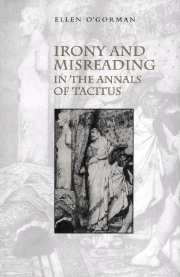35 results
Hugh Last Fellowship: The Roman imperial sententia and the transmission of thought from antiquity to the Renaissance
-
- Journal:
- Papers of the British School at Rome / Volume 91 / October 2023
- Published online by Cambridge University Press:
- 16 November 2023, pp. 349-350
- Print publication:
- October 2023
-
- Article
- Export citation
Chapter 12 - Conspicuous Absence
- from Part II - Absence in Context
-
-
- Book:
- Unspoken Rome
- Published online:
- 03 September 2021
- Print publication:
- 16 September 2021, pp 219-236
-
- Chapter
- Export citation
AN UPDATED VIEW OF ANNALS 4 - (A.J.) Woodman (ed.) The Annals of Tacitus. Book 4. (Cambridge Classical Texts and Commentaries 58.) Pp. xxii + 349. Cambridge: Cambridge University Press, 2018. Cased, £84.99, US$110. ISBN: 978-1-108-41961-1.
-
- Journal:
- The Classical Review / Volume 69 / Issue 2 / October 2019
- Published online by Cambridge University Press:
- 29 March 2019, pp. 474-476
- Print publication:
- October 2019
-
- Article
- Export citation
C. Damon (trans.) Tacitus: Annals. Pp. lxxii + 468, maps. London: Penguin Books, 2012. Paper, £12.99. ISBN: 978-0-140-45564-9.
-
- Journal:
- The Classical Review / Volume 65 / Issue 1 / April 2015
- Published online by Cambridge University Press:
- 26 January 2015, pp. 302-303
- Print publication:
- April 2015
-
- Article
- Export citation
12 - Repetition and exemplarity in historical thought: Ancient Rome and the ghosts of modernity
- from UNFOUNDING TIME IN AND THROUGH ANCIENT HISTORICAL THOUGHT
-
-
- Book:
- The Western Time of Ancient History
- Published online:
- 03 May 2011
- Print publication:
- 31 March 2011, pp 264-279
-
- Chapter
- Export citation
Tacitus - (D.) Sailor Writing and Empire in Tacitus. Pp. xii + 359. Cambridge: Cambridge University Press, 2008. Cased, £55, US$99. ISBN: 978-0-521-89747-1.
-
- Journal:
- The Classical Review / Volume 60 / Issue 1 / April 2010
- Published online by Cambridge University Press:
- 08 March 2010, pp. 135-137
- Print publication:
- April 2010
-
- Article
- Export citation
14 - Intertextuality and historiography
- from Part IV - Modes
-
-
- Book:
- The Cambridge Companion to the Roman Historians
- Published online:
- 28 November 2010
- Print publication:
- 24 September 2009, pp 231-242
-
- Chapter
- Export citation
5 - Citation and authority in Seneca’s Apocolocyntosis
- from Part I - Satire as literature
-
-
- Book:
- The Cambridge Companion to Roman Satire
- Published online:
- 28 May 2006
- Print publication:
- 12 May 2005, pp 95-108
-
- Chapter
- Export citation
CICERO AND THE WRITTEN WORD
-
- Journal:
- The Classical Review / Volume 53 / Issue 2 / October 2003
- Published online by Cambridge University Press:
- 13 April 2006, pp. 346-347
- Print publication:
- October 2003
-
- Article
- Export citation
A. Timonen: Cruelty and Death. Roman Historians’ Scenes of Imperial Violence from Commodus to Philippus Arabs. Pp. 273. Turku: Turun Yliopistl, 2000. Paper. ISBN: 951-29-1818-8.
-
- Journal:
- The Classical Review / Volume 52 / Issue 1 / March 2002
- Published online by Cambridge University Press:
- 12 April 2006, pp. 177-178
- Print publication:
- March 2002
-
- Article
- Export citation
TACITUS ON CIVIL WAR
-
- Journal:
- The Classical Review / Volume 52 / Issue 1 / March 2002
- Published online by Cambridge University Press:
- 12 April 2006, pp. 75-77
- Print publication:
- March 2002
-
- Article
- Export citation
THE ROMANS
-
- Journal:
- The Classical Review / Volume 50 / Issue 2 / October 2000
- Published online by Cambridge University Press:
- 12 April 2006, pp. 527-528
- Print publication:
- October 2000
-
- Article
- Export citation
HISTORICIZING HISTORY
-
- Journal:
- The Classical Review / Volume 50 / Issue 2 / October 2000
- Published online by Cambridge University Press:
- 12 April 2006, pp. 468-470
- Print publication:
- October 2000
-
- Article
- Export citation
Dedication
-
- Book:
- Irony and Misreading in the Annals of Tacitus
- Published online:
- 30 September 2009
- Print publication:
- 10 February 2000, pp vi-vi
-
- Chapter
- Export citation
7 - Ghostwriting the emperor Nero
-
- Book:
- Irony and Misreading in the Annals of Tacitus
- Published online:
- 30 September 2009
- Print publication:
- 10 February 2000, pp 144-175
-
- Chapter
- Export citation
8 - Conclusion: the end of history
-
- Book:
- Irony and Misreading in the Annals of Tacitus
- Published online:
- 30 September 2009
- Print publication:
- 10 February 2000, pp 176-183
-
- Chapter
- Export citation
Contents
-
- Book:
- Irony and Misreading in the Annals of Tacitus
- Published online:
- 30 September 2009
- Print publication:
- 10 February 2000, pp v-v
-
- Chapter
- Export citation

Irony and Misreading in the Annals of Tacitus
-
- Published online:
- 30 September 2009
- Print publication:
- 10 February 2000
6 - The empress's plot
-
- Book:
- Irony and Misreading in the Annals of Tacitus
- Published online:
- 30 September 2009
- Print publication:
- 10 February 2000, pp 122-143
-
- Chapter
- Export citation
Bibliography
-
- Book:
- Irony and Misreading in the Annals of Tacitus
- Published online:
- 30 September 2009
- Print publication:
- 10 February 2000, pp 184-192
-
- Chapter
- Export citation



